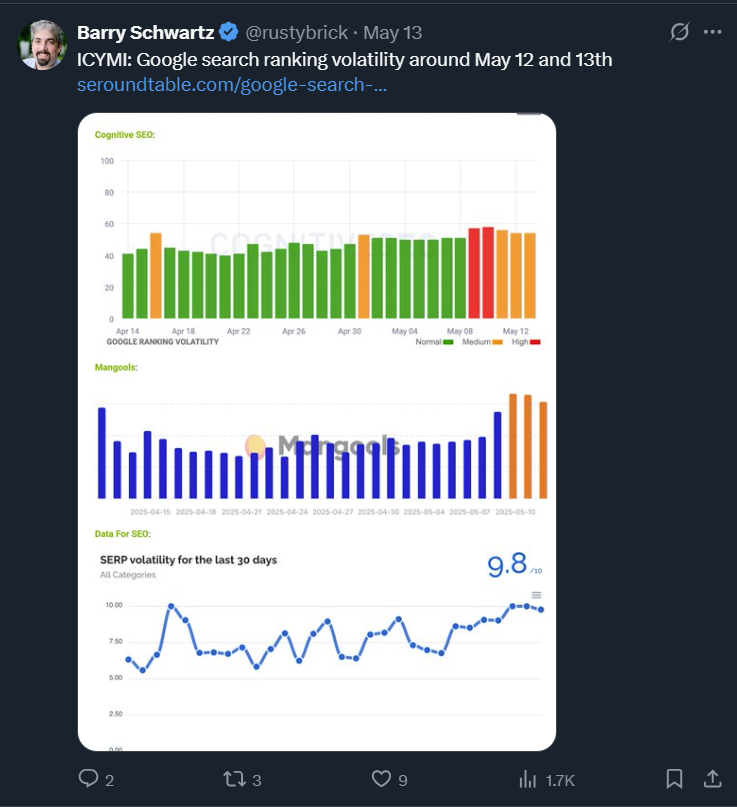The other day I looked over my blog stats in the search rankings on SEMrush. I changed the dates to see how I fared since blogging back in 2012. It was a not pretty picture. It showed me how much I was wasting so much time on blogging for over a decade.
When I first began, I didn’t conduct any keyword research or identify my target audience. I simply wrote about topics that seemed relevant to the content, without any strategic approach.
You can learn from me as I wasted so much time blogging with the proper SEO and AEO tactics like analyzing where your traffic comes from with the Google Search Console. I also used content gaps to rank better.
Table of Contents
Stop Leaving Your Blog Behind: Why You’re Losing Traffic
SEO is not just a buzzword in the world of blogging. It is a powerful tool that can make or break your online presence.
Many bloggers underestimate the impact of SEO, thinking that great content alone will suffice. However, the reality is that without optimizing your blog for search engines, your valuable content may not reach its intended audience.
By neglecting SEO, you are missing out on valuable opportunities to increase your blog’s visibility and reach a larger audience. Standing out without SEO is an uphill battle that can result in your content getting lost in the vast sea of the internet.
In this post, I will share the importance of implementing SEO strategies for your blog so you are not wasting so much time blogging. I will show you the benefits you can reap by not wasting so much time without of SEO.
Stay tuned to learn how you can avoid wasting time and unlock the full potential of your blog through effective SEO practices. You may even earn some affiliate money along the way.

How AEO is Changing SEO
AEO, or Answer Engine Optimization, is shaking up how people approach SEO. Search engines like Google and Bing aren’t just listing websites anymore—they’re pulling answers straight into the results.
Voice assistants, smart devices, and Google’s featured snippets mean users expect clear answers fast. If your content doesn’t answer questions directly, it’s likely missing out on valuable visibility.
Here’s what this shift means for your website:
- Direct answers win: Content needs to provide clear, concise answers to common questions in your niche.
- Structured data matters: Adding schema markup helps search engines understand your site and pull the right information for answer boxes.
- Conversational language counts: Write how people talk. Tools like Google Assistant and Alexa pick up natural language.
- Authority is king: Trustworthy sources get picked first. Back up your answers with facts and link to reliable sites.
- Optimize for snippets: Use headings, lists, and bullet points. Keep answers short and to the point.
If you want more people to find your business online, start focusing on AEO today. Check your content—does it answer real questions in simple language?
Need help? Explore Inspire To Thrives new AEO guide. The way people search is always changing, but clear answers never go out of style.
Why You Are Wasting So Much Time Blogging Without The SEO and AEO Basics
Search Engine Optimization (SEO) serves as the backbone of every successful blog. It determines its visibility and reach on search engine result pages.
You will not waste time doing the research before you hit the pubic button. Understanding the basics and importance of SEO can significantly impact your blog’s performance and organic traffic growth.
Keyword Research and Implementation
Keyword research forms the bedrock of an effective SEO strategy. By identifying frequently searched terms or phrases relevant to your content niche, you can tailor your blog posts to align with user intent.
Tools like Google Keyword Planner and SEMrush can aid in discovering high-volume keywords with low competition, providing insights into what your target audience is searching for.
Last year I purchased the SEMrush deal after using the FREE trial via my blogging friend, Poulomi Basu who opened my eyes to doing more SEO for my blog.
Implementing these keywords strategically throughout your blog content, including in titles, headings, meta descriptions, and naturally within the body text, can boost your chances of ranking higher in search engine results.
Remember, the key is to maintain a balance between optimizing for search engines and providing value to your readers. You don’t want to over optimize either.
Backlink Building Strategies Is Not Wasted Time
Backlinks, also known as inbound links, are crucial for establishing your blog’s authority and credibility in the eyes of search engines. Building a diverse backlink profile from reputable websites signals to search engines that your content is trustworthy and valuable.
Utilize techniques like guest posting on industry-related blogs, reaching out to influencers for collaborations,. Do not forget about incorporating internal links within your content to strengthen your backlink profile.
I wish I had used the Link Whisper plugin years ago, as it saves me so much time today. And if I forget to add the internal links to a new blog post, it reminds me.
By earning quality backlinks from authoritative sources, you can enhance your blog’s online visibility and attract a broader audience.
Consistent effort in building and maintaining backlinks can contribute to long-term SEO success and sustainable organic traffic growth.
On-Page SEO Optimization
Optimizing your blog’s on-page elements is essential for facilitating search engine crawling and indexing processes. Pay close attention to optimizing meta tags, including meta titles and descriptions, to accurately reflect the content of each page.
Structuring your content with clear headings, relevant URLs, and concise yet informative paragraphs can improve user experience and enhance search engine readability.
Additionally, optimizing images with descriptive alt text and maintaining a mobile-responsive design contribute to a well-rounded on-page SEO strategy.
By focusing on these technical aspects, you can ensure that your blog is primed for higher search engine rankings. This will increase more organic traffic to your blog.
Why You Are Wasting So Much Time Neglecting SEO
Neglecting SEO and AEO can have severe repercussions for your blog’s performance and success. Let’s look at the detrimental effects of disregarding SEO practices:

Losing Out On Organic Traffic
With many blogs out there, having a well-optimized blog is crucial for attracting organic traffic. Without proper SEO, your blog may struggle to rank higher in search engine results, leading to minimal visibility.
This translates to fewer visitors discovering your content, ultimately hindering your ability to reach your intended audience effectively.
You will be wasting so much time not getting discovered in the search engines. Why write content if it will never be seen by those searching for your content?
Social Media vs. SEO
You can share your blog posts on social media but how long will that traffic last? The average social media post last anywhere from 18 minutes to 24 hours.
SEO may last forever if done right. Even through the Google updates and algorithm changes you can still rank for some keywords, posts and pages of your blog or website or in the AI overviews.
Competitive Disadvantage
In today’s competitive blogging world, overlooking SEO puts you at a significant disadvantage against competitors who prioritize search engine optimization.
When other blogs implement SEO strategies effectively, they are more likely to appear above yours in search results.
This means they can attract a larger share of visitors and potentially convert them into loyal customers, leaving your blog behind in the digital race.
Impact on Revenue and Monetization
Effective SEO not only drives traffic but also plays a pivotal role in revenue generation and monetization strategies. By neglecting SEO, you risk missing out on valuable income opportunities that stem from increased visibility and user engagement.
Poor SEO practices can impede your blog’s ability to monetize effectively, affecting long-term profitability and growth prospects.
In a fast-paced digital world, leveraging SEO is not just an option but a necessity for sustainable online success. By prioritizing SEO efforts, you can unlock the full potential of your blog.
You will be able to expand your audience reach, and maximize revenue streams like affiliate marketing.
Effective SEO Strategies For Not Wasting So Much Time on Blogging
Implementing effective SEO strategies is crucial for maximizing the visibility and success of your blog.
By focusing on key elements such as content quality and relevance, mobile optimization, site speed, analytics, and monitoring, you can significantly enhance your blog’s performance in search engine rankings.
Content Quality and Relevance
Creating high-quality, relevant content is paramount in attracting and engaging your target audience. Search engines prioritize content that is valuable, informative, and aligns with user intent.
By conducting keyword research, understanding your audience’s needs and preferences, and delivering content that addresses their queries, you can improve your chances of ranking higher in search results.
Remember, quality content is not just about search engines; it’s about building credibility and trust with your readers.
Mobile Optimization and Site Speed
In today’s mobile-driven world, having a mobile-friendly website is no longer optional—it’s a necessity. Search engines like Google prioritize mobile-optimized sites, as more users are accessing the web from smartphones and tablets.
Ensure that your blog is responsive, loads quickly on mobile devices, and provides a smooth user experience. I use AMP for my mobile optimization. AMP ensures that mobile webpages operate at optimal speed.
Optimize images, leverage browser caching, and minimize server response time to improve site speed, which is a crucial factor in SEO rankings.
Emerging Voice Search
Voice search is rapidly gaining traction, impacting how people find content online. As a blogger, optimizing your site for voice queries is crucial. Voice searches tend to be longer and more conversational, so use natural language and focus on answering common questions.
Ensure your content is mobile-friendly and loads quickly, as most voice searches happen on-the-go. Prioritize local SEO by mentioning location details, as many voice queries are location-based.
Ultimately, voice search demands a user-centric approach – create content that directly addresses your audience’s needs and questions.
Stop Wasting So Much Time Without Analytics and Monitoring
Analytics tools play a pivotal role in evaluating your SEO performance, tracking key metrics, and identifying areas for improvement. By monitoring metrics such as organic traffic, bounce rate, click-through rate, and keyword rankings, you can gain valuable insights into how your blog is performing in search results.
Use data-driven decision-making to refine your SEO strategies, identify content gaps, and capitalize on opportunities to enhance your blog’s visibility and reach.
Implementing these SEO strategies will not only help you attract more organic traffic to your blog but also boost your overall online presence.
So stay updated on the latest SEO trends, test different strategies, and continuously optimize your blog for search engines to stay ahead of the competition and stand out in the digital landscape.
I love following Barry Schwartz over on Twitter X for the latest updates.
SEO: Your Blog’s Game-Changer
Think of SEO as your blog’s cutting-edge tool that can propel you ahead in the competitive online landscape.
Effective SEO implementation is not just a trend but a fundamental aspect of digital marketing that can make a significant difference in your blogging journey.
Conclusion: No More Not Wasting So Much Time On Your Blog!
Prioritizing SEO in your blogging endeavors is not just an option; it’s a necessity in today’s fast-paced blogosphere.. Without a proactive approach to SEO, you risk getting lost in the vast blogging world.
You will miss out on valuable opportunities to connect with your target audience and even make money.
Don’t wait until you’re struggling to unravel the secrets of search engine algorithms. Start leveraging SEO strategies from the get-go to set yourself up for blogging success.
By optimizing your content and website for search engines, you can have improved visibility, audience engagement, and overall blog performance.
Are you using SEO for your blog today? I’d love to hear about it in the comments below.
FAQ: How You Are Wasting So Much Time Without SEO For Your Blog
SEO helps your blog get found by search engines. Without it, you’re missing out on free organic traffic. When your posts rank higher in search results, more people find your blog without you spending extra on marketing.
Ignoring SEO means fewer visitors. Most web traffic comes from search engines, and if your blog isn’t optimized, you’re less likely to appear in top search results. This results in significantly lower exposure and fewer readers.
SEO isn’t instant. It can take a few months to a year to start seeing significant changes in your rankings and traffic. However, the effort is worth it as these results are more sustainable compared to paid traffic.
While social media is great for instant engagement, it doesn’t replace SEO. Search engines can provide consistent traffic over time, whereas social media traffic is often more sporadic and unpredictable.
Start with keyword research to find what your audience is searching for. Then, optimize your posts with these keywords in titles, headers, and throughout the content. Also, ensure your blog is mobile-friendly and loads quickly.
Yes, SEO is among the most cost-effective strategies. It targets users who are actively looking for your content, reducing the need to spend heavily on broad-spectrum advertising. Over time, SEO can significantly lower your cost per acquisition.
AEO, or Answer Engine Optimization, is changing how we approach SEO. Search engines now focus more on direct answers than just ranking websites. People want quick, clear solutions instead of scrolling through long lists of links. This shift means that AEO is starting to take over what used to be traditional SEO’s job.
- Ground News Pricing: Are Pro, Premium, and Vantage Packages Worth it? - February 18, 2026
- Instagram Follower Tracker | Save Loads of Time With Dolphin Radar Tracker - February 18, 2026
- GA4 Secret: How to Find and Track AI Overviews Traffic to Your Website - February 16, 2026





